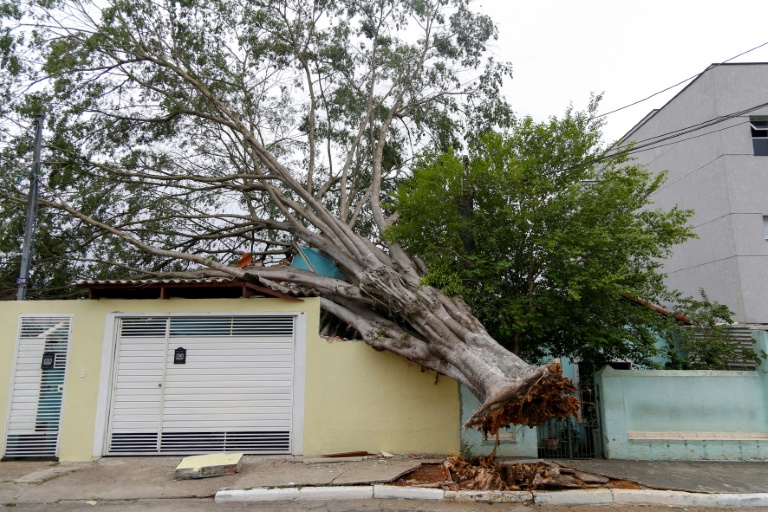Heavy rains in Brazil have resulted in tragic fatalities and considerable disruptions, as authorities reported at least eight deaths after storms impacted the country over the weekend. Following a prolonged period of severe drought, which had already triggered record wildfires, much of central and southeastern Brazil has faced relentless weather conditions. The National Institute of Meteorology indicated that significant winds, reaching up to 62 miles per hour, accompanied by heavy rainfall of up to four inches daily, impacted these regions. Many residents have been affected by this sudden change in the weather, which has been both a blessing for those suffering from drought conditions and a burden for those facing the immediate dangers of the storms.
Sao Paulo, Brazil’s most populous state, has been the most severely affected area, with seven fatalities reported. Most of these deaths resulted from falling trees and collapsing structures, consequences of the violent winds and rainfall battering the region. The state’s civil defense team has been actively involved in managing the aftermath of the storms, as residents grapple with the destruction to homes and public spaces alike. The extreme weather has not only claimed lives but also caused significant infrastructural damage, making the work of local authorities even more urgent.
In urban areas such as Sao Paulo city, the impact of the storms has led to widespread blackouts, with energy company Enel estimating that around 1.6 million homes and businesses were left without electricity. This has posed significant challenges for residents trying to navigate daily life amid such crises. The local governmental response has been tested considerably by these adverse weather conditions, affecting emergency services as they have to respond to an increase in incidents related to the weather.
The capital, Brasilia, has also felt the effects of the storms; a tragic incident occurred when a soldier was killed and another injured due to a falling tree while they were engaged in a routine task outside the military police headquarters. Such incidents highlight the immediate risks posed by the inclement weather. In a bizarre twist, officials inside the Brazilian Congress’s Chamber of Deputies were seen needing to use umbrellas indoors as torrential rains caused leaks in the roof, further emphasizing the unusual severity of the conditions being faced.
While the fallout from the storm has resulted in casualties and devastation, some residents have welcomed the rain, particularly in Brasilia, where the city had experienced a staggering 165 days without precipitation. For many, the sudden downpour has been a welcome relief, albeit overshadowed by the immediate dangers of severe weather. The rainfall is perceived as a potential remedy for the prolonged drought that has gripped the region, which has raised concerns about water supplies and agricultural production.
Experts have pointed to climate change as a significant factor behind Brazil’s recent extremes, including its worst drought since records began. Drought conditions have not only led to wildfires devastating regions like the Amazon rainforest but have also affected wildlife and air quality across major cities due to smoke inhalation from fires. As Brazil grapples with these environmental challenges, the recent storms serve as a stark reminder of the volatility of the climate and the need for comprehensive strategies to adapt to and mitigate the impacts of these ongoing changes.

